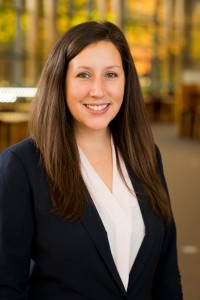Assistant Professor Melissa Sreckovic, who joined the University of Michigan-Flint in September 2015, found her passion for the field of special education while teaching in a Cary, North Carolina elementary school a few years ago. She had the privilege of teaching many exceptional students, but two particular students with autism spectrum disorder (ASD) greatly inspired her.
“Those two students taught me more in that one year than I could have possibly taught them,” she recalled. “Many students with ASD are often misunderstood and isolated. I decided to go back to school to learn best practices for helping these students achieve both academic and social success.”
Assistant Professor Sreckovic began further researching ASD. She earned her Ph.D. in Education with a concentration in special education from the University of North Carolina-Chapel Hill. Her research there focused on building peer networks for adolescents with ASD to help them build friendships with peers. “It is amazing what a big difference a simple intervention can make,” she said. “It was so neat to watch these students, who typically ate lunch by themselves, be invited to eat lunch with their peers every day once the intervention started.”
At UM-Flint Sreckovic teaches EDN 410/510 Teaching in the Inclusive Classroom; EDE 440/550 Classroom Management; EDN 502 Family, School and Community Collaboration; EDN 600 Overview of Learning Disabilities.
What are your research interests? My research interests focus on school-based interventions for students with ASD with an emphasis on interventions related to increasing social interaction and reducing rates of bullying victimization. I am also interested in examining best practices for inclusive education, primarily strategies for increasing peer acceptance and tolerance among all students. Additionally, I am interested in identifying evidence-based practices for use with individuals with ASD to support educators and families in choosing effective interventions.
What projects are you currently working on? I am currently working on a focus group study with Dr. De’Andre Shepard and special education graduate student, Wendy Kirsch. We are examining the professional development needs of teachers who teach inclusive classrooms from the perspectives of general and special educators, special education supervisors, principals, and superintendents. I am also working on a systematic literature review to determine the evidence base of an intervention implemented with middle and high school students with ASD to increase social interaction between students with ASD and their peers.
Who has inspired you in your field? I have been greatly inspired by several researchers in the field. Dr. Erik Carter at Vanderbilt University has designed highly effective interventions for youth with ASD and youth with Intellectual Disabilities. Much of my work has transpired because of his work. I have also been amazed by the work of Dr. Kara Hume at the Frank Porter Graham Child Development Institute and Dr. Kathleen Lane at the University of Kansas. Both Dr. Hume and Dr. Lane have made significant contributions to the field of special education, but I am mostly inspired by the practicality of their work and the direct impact it has on practicing teachers and children and youth with disabilities.
What challenges do you see occurring in the education field? One of the biggest challenges that I see in the field of education today is the separation between general education and special education. Our goal as educators is to provide a high quality education to all children and to help all children succeed academically, socially, and behaviorally. Every educator in a school building should take ownership of and pride in every child.
What do you want your students at UM-Flint to know about your field and how they can succeed as future educators? I want my students to know that students with disabilities are people first. They have goals and dreams, and they want to learn, have fun, and make friends just like every other student. I also want my students to know that all children can learn and it is their challenge to determine how to make that happen. To succeed as a future educator, think proactively. Think about how a student will respond during a transition and make the necessary accommodations. I hope my students will remember two things: first, that small gestures, such as taking the time to ask a student about their weekend or eating lunch with a student, may have a great impact on a student and, second, that they have been chosen for one of the hardest and most rewarding jobs — and truly what they do every day will impact the world!

